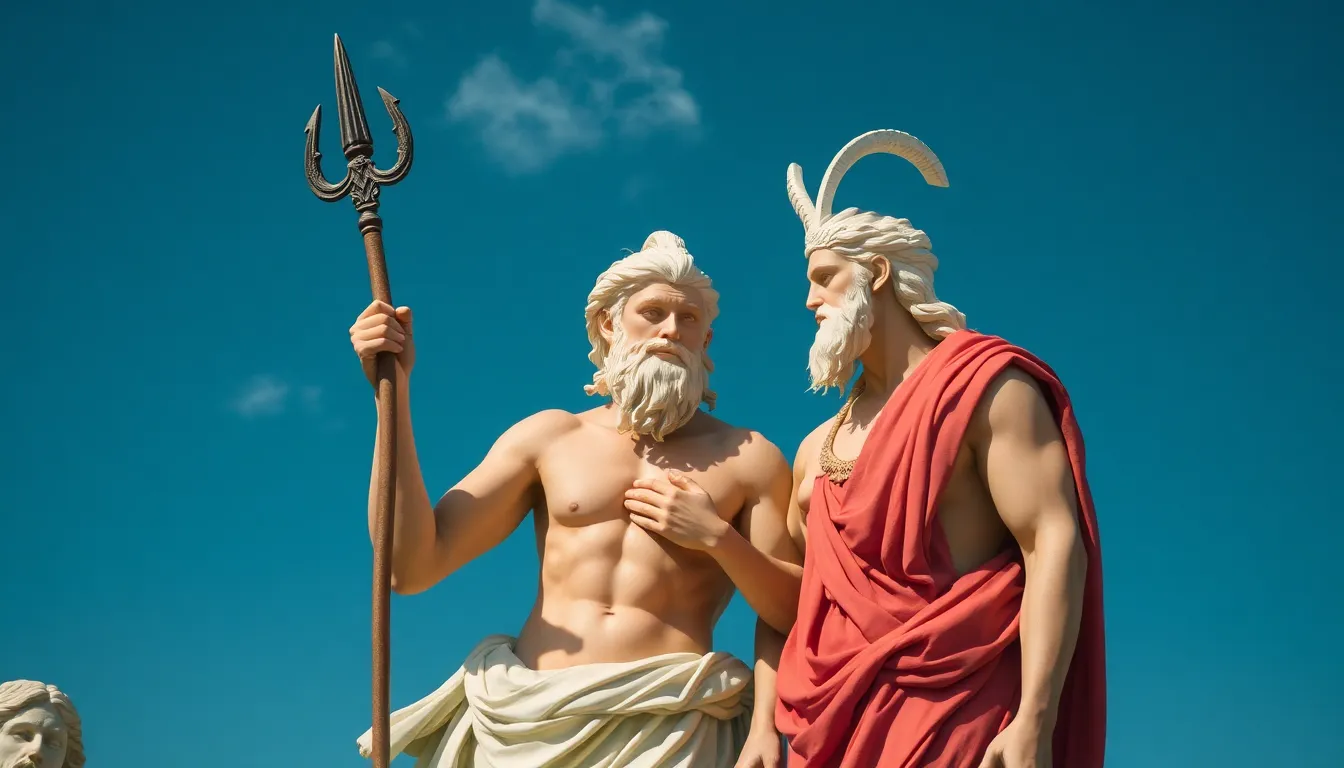The Most Unexpected Mortal Relationships with Greek Gods
Introduction: The Allure of the Divine
Greek mythology is a rich tapestry of stories that encompass a vast pantheon of gods, goddesses, and mythical beings. These tales often explore themes of love, ambition, betrayal, and the human condition, reflecting the complexities of life. One of the most fascinating aspects of these myths is the interactions between mortals and the divine. These unexpected relationships reveal the vulnerabilities and strengths of both mortals and gods, illuminating the depth of human emotions and experiences.
The Unlikely Love of Eros and Psyche
Eros, known as the god of love, holds a prominent place in Greek mythology. He is often depicted as a youthful figure wielding a bow and arrows, capable of igniting passion and desire in those he targets. His story intertwines with that of Psyche, a mortal woman whose beauty rivaled that of Aphrodite, the goddess of love and beauty. This jealousy led to a series of trials for Psyche, as she navigated the challenges imposed by the divine.
The trials Psyche faced were numerous and harrowing, including tasks set by Aphrodite that tested her resolve and trust. Themes of trust, betrayal, and redemption are woven throughout their relationship as Psyche ultimately proved her love for Eros by enduring these trials. The couple’s journey reflects the complexities of love, showcasing that true love often requires sacrifice and perseverance.
Persephone and Hades: Love in the Underworld
The relationship between Persephone and Hades is one of the most compelling in Greek mythology. Persephone, the daughter of Demeter, was abducted by Hades to become the queen of the Underworld. Initially, this abduction was an act of force, but over time, it transformed into a complex partnership built on understanding and companionship.
This relationship symbolizes the cyclical nature of life and death, as Persephone’s dual existence in both the Underworld and the mortal realm gives rise to the changing seasons. When she descends to Hades, the earth experiences winter; when she returns to her mother, spring blooms. Their story embodies the nuances of love that can arise from unexpected circumstances, highlighting the idea that love can flourish even in the darkest places.
Apollo and Daphne: The Tragic Pursuit
Apollo, the god of prophecy, music, and the arts, found himself infatuated with Daphne, a beautiful nymph devoted to her independence. The pursuit of Daphne by Apollo is a tale filled with desire and rejection. Despite Apollo’s relentless attempts to win her heart, Daphne’s desire to remain untouched and free led her to flee from his advances.
In a desperate attempt to escape, Daphne prayed to the gods for help, and they transformed her into a laurel tree. This tragic ending reflects deep themes of identity and autonomy, showcasing the painful reality of unrequited love. The story serves as a poignant reminder of the complexities of desire and the often-painful consequences of rejection.
Hercules and Deianira: A Love Tested by Fate
Hercules, the legendary hero known for his strength and heroic feats, fell deeply in love with Deianira. Their love story began with passion but soon spiraled into tragedy due to jealousy and misunderstanding. When Hercules encountered the centaur Nessus, a conflict arose that would ultimately test the bonds of love between him and Deianira.
Deianira, fearing the loss of Hercules’ love, was misled into believing that a potion made from Nessus’ blood would ensure her husband’s fidelity. However, this potion turned out to be a fatal poison, leading to a tragic end for Hercules. Their story underscores the themes of love, sacrifice, and the unforeseen consequences of choices, reminding us that even the strongest bonds can be shattered by misunderstandings and external influences.
Aphrodite and Anchises: The Mortal Prince and the Goddess of Love
The union of Aphrodite and Anchises is an unexpected love story that highlights the intersection of divine and mortal realms. Aphrodite, the goddess of love, was struck by Anchises’ beauty and decided to seduce him. Their relationship bore Aeneas, a hero destined to play a significant role in Trojan mythology.
This coupling illustrates the balance between divine involvement and human experience, as Aeneas inherited qualities from both his parents. The implications of their union echo through history, as Aeneas’ journey would eventually lead to the founding of Rome. The story of Aphrodite and Anchises reveals how mortal relationships with gods can have far-reaching consequences, shaping the course of history and mythology.
The Complicated Bond of Odysseus and Calypso
Odysseus, the clever hero of the “Odyssey,” found himself entangled with Calypso, a nymph who lived on the island of Ogygia. Captivated by Odysseus’ charm and wit, Calypso held him captive for several years, hoping to make him her immortal husband. Their relationship highlights the themes of longing, captivity, and the nature of true love.
Despite Calypso’s affection and the comforts of her island, Odysseus yearned to return home to Ithaca and his wife, Penelope. Ultimately, he chose freedom and the pursuit of his destiny over the comforts of immortality. This choice emphasizes the importance of free will and the sacrifices one must make for true love, making Odysseus’ journey not just a physical one, but also a deep emotional exploration.
Conclusion: The Legacy of Mortal-God Relationships
The relationships between mortals and gods in Greek mythology offer profound insights into the human experience. From the trials of love to the challenges of sacrifice, these stories shape our understanding of love, desire, and the complexities of relationships. They illustrate that love can transcend boundaries, but also that it can come with pain and sacrifice.
These mythological tales continue to resonate in contemporary culture and literature, inspiring countless adaptations and interpretations. As we delve into these intricate stories, we are reminded of the timeless nature of love and the enduring legacy of these mortal-god relationships in shaping human connections.




